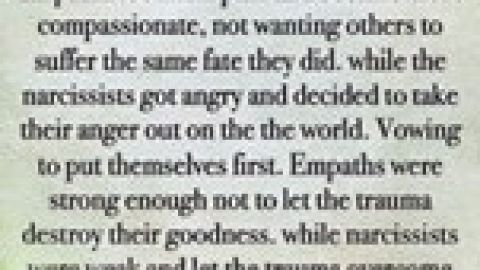this is all based on my own experience so this dose not conut for every one also not everyone with NPD is an abuser
**What is Narcissism?**
Narcissism is a personality disorder characterized by an inflated sense of self-importance, a need for admiration, and a lack of empathy for others. People with narcissistic personality disorder (NPD) are often grandiose, arrogant, and entitled. some people with NPD may also be manipulative, exploitative, and cruel (but not all the time)
NPD is thought to be caused by a combination of genetic and environmental factors. It is more common in men than in women, and it typically begins in adolescence or early adulthood.
**Symptoms of NPD**
The symptoms of NPD can vary from person to person, but they may include:
* An inflated sense of self-importance
* A need for admiration
* A lack of empathy for others
* Grandiosity
* Arrogance
* Entitlement
* Manipulativeness
* Exploitativeness
* Cruelty
People with NPD may also have difficulty regulating their emotions, and they may be prone to outbursts of anger or rage. They may also be hypersensitive to criticism and rejection.
**Treatment for NPD**
There is no cure for NPD, but therapy can help people with the disorder to manage their symptoms and improve their relationships with others. Therapy may include:
* Individual therapy
* Group therapy
* Family therapy
* Medication
**Outlook for NPD**
The outlook for people with NPD is variable. Some people with the disorder are able to manage their symptoms and live relatively normal lives. Others may experience significant difficulties in their personal and professional lives.
**If you think you may have NPD, it is important to seek professional help. A therapist can help you to diagnose the disorder and develop a treatment plan.**
**Being the Middle Child with Narcissistic Parents: A Hidden Struggle**
Growing up as the middle child in a family with narcissistic parents can be a uniquely challenging and isolating experience. While the oldest and youngest children may receive more attention and support, the middle child often feels overlooked and undervalued. This can lead to a range of psychological and emotional difficulties that can persist into adulthood.
**Emotional Neglect and Invalidation**
Middle children with narcissistic parents often report feeling emotionally neglected. They may not receive the same level of attention or affection as their siblings, and their feelings and needs may be dismissed or ignored. This can lead to feelings of loneliness, worthlessness, and a sense of being invisible.
Narcissistic parents may also invalidate their middle child’s experiences and emotions. They may dismiss their feelings as ‘overdramatic’ or ‘attention-seeking,’ which can make the child feel like they cannot trust their own judgment. This can lead to self-doubt, anxiety, and difficulty forming healthy relationships.
**Scapegoating and Triangulation**
In some cases, middle children may be scapegoated by their narcissistic parents. They may be blamed for the family’s problems or used as a scapegoat to avoid conflict between the parents. This can lead to feelings of shame, guilt, and isolation.
Narcissistic parents may also triangulate their children, pitting them against each other in order to gain control. This can create a sense of rivalry and competition between the siblings, and prevent them from forming close bonds.
**Effects on Adulthood**
The emotional neglect and invalidation experienced by middle children with narcissistic parents can have lasting effects on their adulthood. They may struggle with low self-esteem, anxiety, and depression. They may also have difficulty forming and maintaining healthy relationships.
Additionally, middle children may develop a sense of entitlement or a need for constant validation. They may feel like they have to prove themselves in order to gain attention and approval. This can lead to burnout, workaholism, and other unhealthy behaviors.
**Coping Strategies**
Coping with the challenges of being the middle child with narcissistic parents requires self-care, resilience, and a strong support system. Here are some strategies that may help:
* **Set boundaries:** Establish clear boundaries with your parents to protect your emotional well-being.
* **Practice self-validation:** Learn to validate your own feelings and experiences, even if your parents do not.
* **Seek support:** Connect with trusted friends, family members, or a therapist who can provide emotional support and validation.
* **Focus on your strengths:** Identify and focus on your positive qualities and accomplishments. This will help you build a stronger sense of self-worth.
* **Consider therapy:** Therapy can provide a safe and supportive space to process your experiences and develop healthy coping mechanisms.
Being the middle child with narcissistic parents can be a difficult and isolating experience. However, with self-care, resilience, and support, it is possible to overcome the challenges and build a fulfilling life.
**The Invisible Wounds: Self-Harm and Narcissistic Parents**
Self-harm is a serious issue that affects countless individuals, often leaving them in a cycle of pain and despair. However, for those who endure self-harm alongside narcissistic parents, the experience is uniquely challenging and isolating.
**The Isolation of Self-Harm**
Self-harm is a coping mechanism that people use to manage intense emotions or numb themselves from pain. However, it is often met with shame, judgment, and misunderstanding. This isolation can be exacerbated for individuals with narcissistic parents, who may lack empathy and minimize the severity of their child’s struggles.
**Narcissists’ Lack of Empathy**
Narcissistic parents often struggle to understand the emotional experiences of others. They prioritize their own needs and desires, even at the expense of their children. As a result, they may dismiss self-harm as attention-seeking or manipulative behavior.
**Making It About Themselves**
When confronted with their child’s self-harm, narcissistic parents often turn the situation around to make it about themselves. They may accuse their child of being ungrateful, disobedient, or even responsible for their own pain. This deflection and blame-shifting can be extremely damaging to the child’s self-esteem and recovery.
**Impact on the Child’s Well-being**
The lack of support and empathy from narcissistic parents can have devastating consequences for the child’s well-being. They may feel abandoned, worthless, and unable to escape the cycle of self-harm. The constant invalidation and gaslighting from their parents can further erode their sense of self and make it difficult to seek help.
**Seeking Support**
If you are struggling with self-harm and have narcissistic parents, it is crucial to seek support from trusted individuals or organizations. Therapists, support groups, and hotlines can provide a safe and understanding environment where you can share your experiences and work towards healing.
**Remember:**
* Self-harm is a serious issue and you deserve support.
* Narcissistic parents often lack empathy and may not understand your struggles.
* It is not your fault that your parents are narcissistic.
* You are not alone in this and there are people who care about you.
* Recovery from self-harm is possible with the right support and resources.
If you or someone you know is struggling with self-harm, please reach out for help. You are not alone, and there is hope for recovery.




